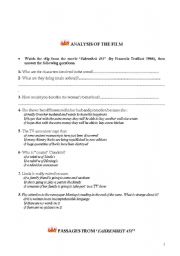
|
Standardization and mass media in ´Fahrenheit 451´
CONTENTS AND AIM: This is the last activity to conclude the thematic module on the influence of mass media in the first half of the twentieth century and in the novels by Orwell, Huxley and Bradbury.
In this final section, in particular, students will focus their attention on the inversely proportional relation which exists between mass media and traditional culture, i.e. how the growth of the first element involves the reduction of the second one. Moving from the assumption that the potentials of mass media can be completely exploited with the elimination of any ‘interference’ which could divert people from the message they diffuse, it is easy to understand the sheer ‘war’ that dictators made against any form of independent cultural expression, the written word first of all. The destruction of the culture of the past and the subjection of the contemporary one were one the most distinctive features of the policy of authoritative governments. Probably because of this very attack on the intellectual world, through this module we can find a great number of similarities among the three novels. From the themes it deals with, one can come to the conclusion that all the three writers were against a political power which, also thanks to a wrong use of mass media, was silencing the intellectual world. In these three novels one can find the literary counterpart of all the elements that menaced culture in that period of history. Censorship was one of the aspects of which the authors always felt the oppression. Step 1 deals with this topic pointing out how it was the prerequisite for a real propaganda activity which otherwise would not have the same effect on public opinion. Censorship was the result of the strict control to which the new media were subjected to prevent the promotion of ideas alternative to those projected by government. Censorship dealt not only with the prevention of the diffusion of ‘inconvenient’ productions but also with the destruction of any historical evidence of such a kind. As step 2 points out, books, above all – as the representative of the old culture – underwent the most unscrupulous process of destruction. Step 3 goes on even further to the destruction of documents and describes the more disquieting practice of their distortion. Through such a device, the authority could not only eliminate anything that ‘interfered’ with power but also distort circumstances at its own advantage, presenting a situation which was completely different from the real one. The direct consequence of this annihilation of the cultural system was that of putting intellectuals in a dilemma: conforming or being ‘eliminated’ as their own works. The central theme of all the three novels is the risk of the intellectuals of being completely silenced and drawn into the spiral of a political power which was rapidly growing in importance thanks to the new means it had at its disposal, The fear of conformation, that in step 4 mainly concerns the intellectual world, extends to the whole society in the following one. This final part (step 5) describes how mass media, even though on the one hand promoted an enlargement of the diffusion of culture, on the other hand contributed to undermine the importance of the concept of the individual to the advantage of the mass and quickened the tendency of modern society to go towards the depersonalization of its members. The process is presented as a sort of cause and effect succession which involved many aspects. One of them was the need of facing the great number of people that from the beginning of the twentieth century started inhabiting the new metropolis. This necessity led to the creation of mass products, among which culture itself which became more and more a commercial good particularly through its media promotion. All the three authors underline in their novels ways in which the means of communication are not used to promote real culture but only a debased ‘surrogate’ of it.
On the whole, this module is not conceived to be a judgement or to find an answer to this complex phenomenon, but only to provide a starting point to the students and make them consider to what an extent also the members of our modern society are really free or not
Level:advanced
Age: 14-17
Downloads:24 |
|
Copyright 04/6/2009 elice
Publication or redistribution of any part of this
document is forbidden without authorization of the
copyright owner.
|


see more worksheets by elice
|